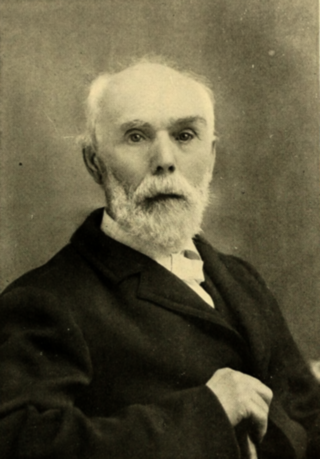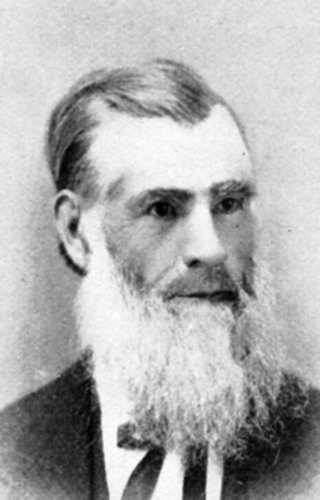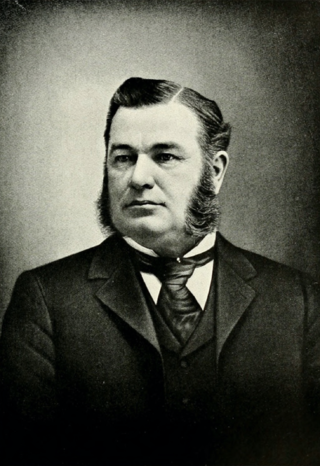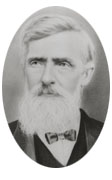Related Research Articles

Hubert Howe Bancroft was an American historian and ethnologist who wrote, published, and collected works concerning the Western United States, Texas, California, Alaska, Mexico, Central America, and British Columbia.

John Whiteaker was an American politician, soldier, and judge. A native of Indiana, he joined the army during the Mexican–American War and then prospected during the California Gold Rush. After moving to the Oregon Territory, he served as a judge and member of the legislature. A Democrat, Whiteaker served as the first state Governor of Oregon from 1859 until 1862 and later was Oregon's Congressman from 1879 to 1881. He also was president of the Oregon State Senate and Speaker of the Oregon House of Representatives.

The Oregon Railroad and Navigation Company (OR&N) was a rail and steamboat transport company that operated a rail network of 1,143 miles (1,839 km) running east from Portland, Oregon, United States, to northeastern Oregon, northeastern Washington, and northern Idaho. It operated from 1896 as a consolidation of several smaller railroads.

William Henry Gray (1810–1889) was a pioneer politician and historian of the Oregon Country in the present-day U.S. state of Oregon. He was an active participant in creating the Provisional Government of Oregon. Gray later wrote the book A History of Oregon, 1792-1849 and was instrumental in the establishment of the Oregon Pioneer Society.

Columbia Lancaster was an American lawyer and politician who served as the first Delegate from the Territory of Washington to the United States House of Representatives.

Oregon's Territorial Legislature was a bicameral legislative body created by the United States Congress in 1848 as the legislative branch of the government of the Oregon Territory. The upper chamber Council and lower chamber House of Representatives first met in July 1849; they served as the region's legislative body until Oregon became a state in February 1859, when they were replaced by the bicameral Oregon State Legislature.

The Oregon Steam Navigation Company (O.S.N.) was an American company incorporated in 1860 in Washington with partners J. S. Ruckle, Henry Olmstead, and J. O. Van Bergen. It was incorporated in Washington because of a lack of corporate laws in Oregon, though it paid Oregon taxes.

Henry Failing was a banker, and one of the leading businessmen of the Pacific Northwest of the United States. He was one of Portland, Oregon's earliest residents, and served as that city's mayor in two non-consecutive periods, two-and-a-half years starting in 1864 and later a two-year term starting in 1873. He was a Republican.

Francis A. Chenoweth was an American lawyer and politician in the Pacific Northwest. A native of Ohio, he lived in Iowa and Wisconsin before immigrating to the Oregon Territory. There he served in the legislature of the Oregon Territory and then the Washington Territory, including serving as Speaker of the Washington House of Representatives. A Democrat, he then served on the Washington Supreme Court before returning to Oregon where he was elected to the Oregon House of Representatives and was selected as Speaker of the body for one session.
Frederick Waymire was an American farmer and politician in what became the state of Oregon. A native of Ohio, he served in the Oregon Territorial Legislature and was a member of the Oregon Constitutional Convention. He also helped start the La Creole Academy in Polk County and represented that county in the Oregon House of Representatives after Oregon became a state.
The Thomas and Ruckle Road, also known as Ruckles Road or Ruckels Road, was a wagon road over the Blue Mountains.
The history of rail in Oregon predates the transcontinental railroad in 1869.
The Military Division of the Pacific was a major command (Department) of the United States Army during the late 19th century.

Charles Stewart Drew, also known as C.S. Drew, was a representative in the legislature of the Oregon Territory of the United States and quartermaster general of the territorial militia in the 1850s. During the American Civil War, he was a Union Army officer, serving in the 1st Oregon Cavalry regiment. He eventually reached the rank of lieutenant colonel. In 1864, he led an Army reconnaissance party into southeastern Oregon. The expedition, known as the Owyhee Reconnaissance, traveled through uncharted country from Fort Klamath to Fort Boise and back. Drew was the author of two historically important military reports; one documented Indian attacks on American settlers in the Oregon Territory and the other was his report of the Owyhee Reconnaissance.
Negro Flat was a placer gold mining camp on the Salmon River, now located in Siskiyou County, California. It was located originally in Trinity County, in 1850.
Gullion's Bar was a placer gold mining camp on the Salmon River, now located in Siskiyou County, California. It was located originally in Trinity County, in 1850.

The Dalles Mint was to be a branch of the United States Mint in The Dalles in Oregon. Partially constructed in 1869, the planned two-story structure was never completed and the mint was never put into operation. Located in the downtown area of the city, the building was given to the state before it was sold to the public. The Mint building was most recently home to the Erin Glenn Winery.

Willamette was an American steamer that was later purchased by China and saw action during the Taiping Rebellion.

Nathaniel Holly Gates, also known as Colonel Gates for most of his life, (1811–1889) was an American pioneer lawyer and Oregon state legislator. He was an active Democrat throughout his life. He served four terms in Oregon's territorial legislature. This included one term as Speaker of the Oregon House of Representatives during the 1858 legislative session. After Oregon became a state in 1859, he served one two-year term in the Oregon House of Representatives and one four-year term in the Oregon State Senate. Before immigrating to Oregon, Gates lived and worked as a lawyer in Ohio and Iowa. After moving to Oregon, he settled in The Dalles and opened a law practice there. He helped develop that community and served as the city's mayor five times in non-consecutive terms.
References
- 1 2 3 4 5 Bancroft, Hubert Howe (1888). History of Oregon. Vol. II. San Francisco, California: History Company. p. 481. Retrieved March 23, 2018.
- ↑ Deumling, Dietrich (May 1972). The roles of the railroad in the development of the Grande Ronde Valley (masters thesis). Flagstaff, Arizona: Northern Arizona University. pp. 13–15, 27–28. OCLC 4383986.
- ↑ Worker's of the Writers Program of the Works Progress Administration (1940). Oregon, End of the Trail. American Guide Series. US History Publishers. p. 71. ISBN 1-60354-036-9.
- ↑ Bancroft, Hubert Howe (1888). History of Oregon. Vol. II. San Francisco, California: History Company. p. 432. Retrieved March 23, 2018.
- ↑ "1858 Regular Session (1st Pre-Admission)". Oregon Legislators and Staff Guide. Oregon State Archives. Retrieved 18 January 2010.
- ↑ "1859 Special Session". Oregon Legislators and Staff Guide. Oregon State Archives. Retrieved 18 January 2010.